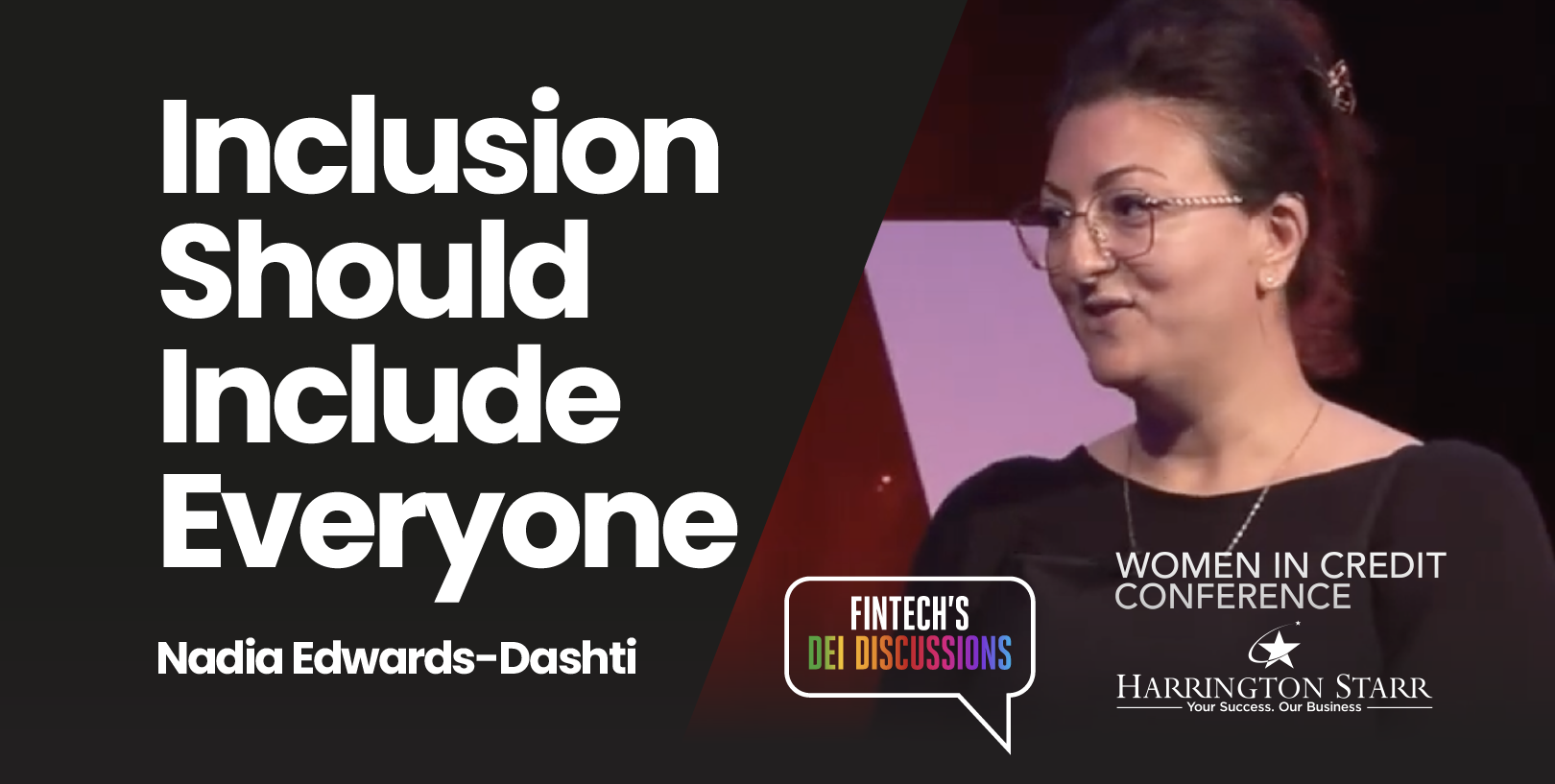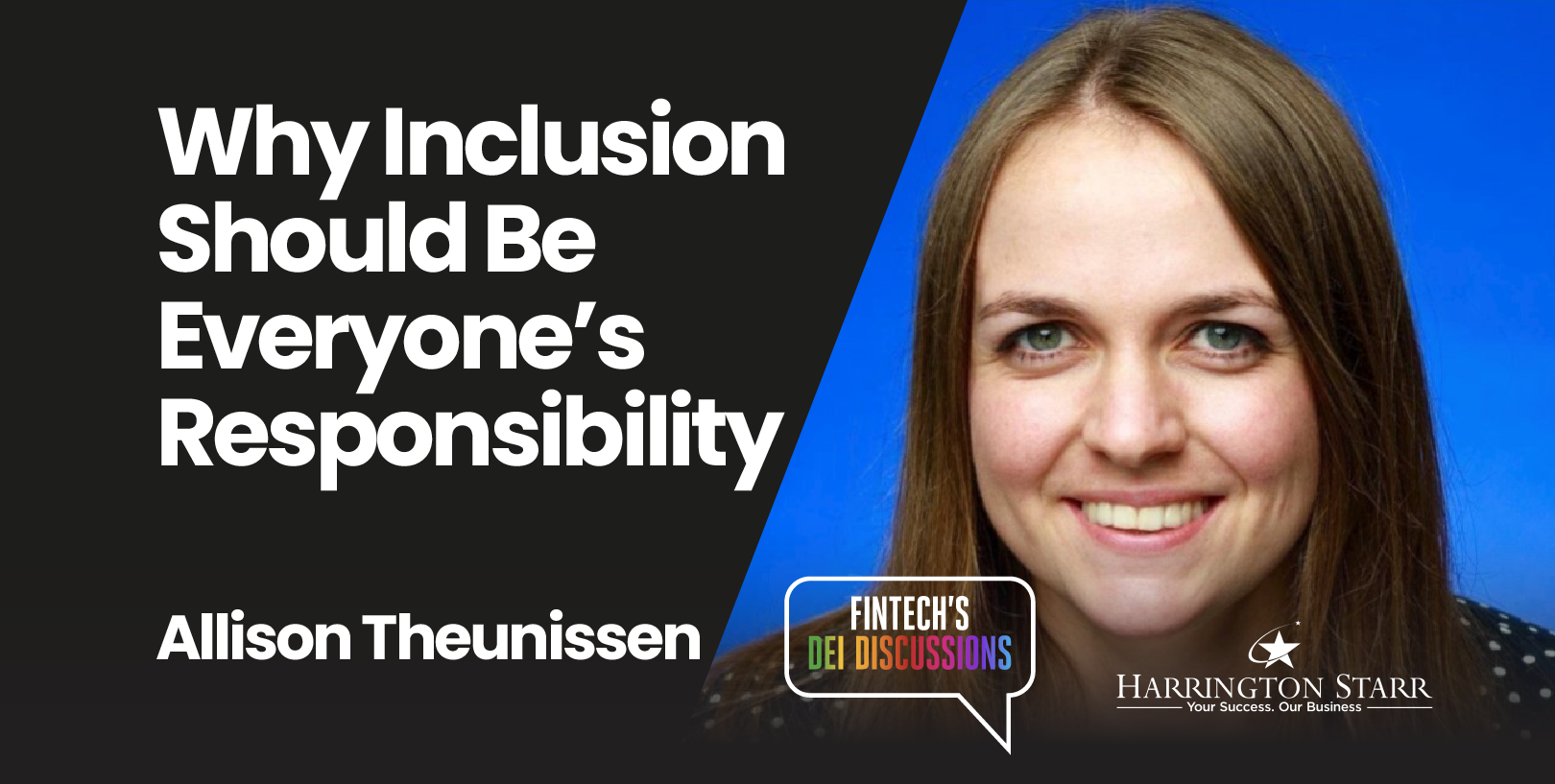
In the dynamic and ever-evolving landscape of FinTech, the conversation surrounding diversity and inclusion is not merely an industry trend but a crucial pillar for sustainable growth and innovation. At the Women in Credit Event 2024, our Chief Customer Officer at Harrington Starr, Nadia Edwards-Dashti, took to the stage to address this vital topic in her enlightening talk titled "Inclusion Should Include Everyone.”
Understanding the Landscape of Inclusion in FinTech
The FinTech industry has seen remarkable advancements in recent years, yet the journey toward authentic inclusion remains ongoing. Nadia opened her talk by acknowledging the progress made but emphasised that substantial gaps still exist. She posed a critical question that set the tone for the discussion: why do certain individuals feel excluded when discussions about inclusion arise?
Drawing from her extensive experience of over 20 years in recruitment—primarily within financial services and technology—Nadia shared her personal narrative. She recounted entering rooms where she felt a palpable sense of being "othered," a sentiment that many in the audience could relate to. This feeling serves as a poignant reminder that diversity is not solely about numbers; it is fundamentally about cultivating an environment where everyone feels valued and welcome.
The Difference Between Diversity and Inclusion
A central theme of Nadia's presentation was the distinction between diversity and inclusion. She explained that while diversity focuses on the presence of various demographic groups within an organisation, inclusion centres on how those individuals are treated and whether their voices are heard. This distinction is crucial in the context of FinTech recruitment, as Nadia highlighted that attracting diverse talent is only the beginning. Organisations must also prioritise retaining, promoting, and compensating these individuals fairly.
Nadia further illustrated her point by discussing the challenges that often arise within organisations. Many companies may boast diversity in their workforce but fail to create a culture of inclusion where all employees feel empowered to share their perspectives. This lack of genuine inclusivity can lead to disengagement and ultimately affect the organisation's overall performance.
The Call for Change: FinTech Transformation and Support
The transformation needed within the FinTech sector requires a cultural shift that involves everyone—from senior leadership to entry-level positions. Nadia urged leaders to critically examine their biases and consider how they can actively foster an inclusive environment. She outlined several effective strategies that organisations can implement:
Investing in People: One of the most impactful ways to promote inclusion is to invest in the growth and development of all employees, particularly those from underrepresented backgrounds. This investment can take the form of mentorship programmes, leadership training, and initiatives aimed at increasing visibility for women and minority groups in FinTech roles.
Creating Safe Spaces for Dialogue: To foster genuine inclusion, organisations must create environments where employees feel comfortable sharing their thoughts and experiences. These safe spaces are essential for building trust and ensuring that diverse perspectives are valued and incorporated into decision-making processes.
Challenging the Status Quo: Nadia emphasised the need for organisations to reevaluate traditional FinTech recruitment practices and job descriptions that may inadvertently favour certain demographics. By focusing on the skills and experiences that truly matter for roles—especially in areas like cloud engineering, DevOps, and software engineering—companies can broaden their talent pool and promote a more inclusive workforce.
The Importance of Financial Technology Representation
Representation was a recurring theme in Nadia's speech. She passionately discussed the critical need for more women in leadership positions within the FinTech sector. When women occupy decision-making roles, it leads to more comprehensive solutions and better outcomes for organisations and their clients.
Nadia also shared compelling statistics that illustrate the current FinTech gender disparity within the industry, particularly in technical roles. While progress has been made in terms of overall workforce diversity, women are still underrepresented in key areas such as product development, data science, and AI. This ongoing disparity highlights the urgent need for organisations to actively recruit and promote women and other underrepresented groups.
Practical Steps for Fostering Financial Tech Inclusion
Throughout her talk, Nadia provided practical steps for organisations seeking to enhance their inclusion efforts. Here are some of the key recommendations she made:
Assess Current Practices: Organisations should conduct audits of their existing policies and practices to identify areas for improvement. This includes examining recruitment processes, promotion criteria, and pay equity to ensure that they align with the goal of fostering an inclusive workplace.
Engage FinTech Employees: Soliciting feedback from employees about their experiences within the organisation is vital. This can be accomplished through surveys or focus groups, which can provide valuable insights into the effectiveness of current inclusion initiatives.
Set Measurable Goals: Establishing clear, measurable goals for diversity and inclusion efforts is essential. These goals should be communicated to all employees and regularly reviewed to track progress. For example, organisations could aim to increase the percentage of women in leadership roles by a certain percentage over a specified time frame.
Celebrate Successes: Recognising and celebrating the achievements of individuals and teams who contribute to a more inclusive workplace can serve as a powerful motivator. Highlighting success stories can encourage others to engage in inclusion efforts and create a sense of shared ownership over the organisation's diversity initiatives.
The Role of Technology in Inclusion
As a technology recruitment business, Harrington Starr understands the critical role that technology plays in driving inclusion. From data analytics to AI, various tools are available to help organisations identify gaps in their diversity efforts and track progress over time.
For instance, leveraging data can provide insights into hiring patterns and employee demographics, enabling organisations to make informed decisions about their recruitment strategies. Additionally, technology can facilitate remote work and collaboration, making it easier for companies to attract diverse talent from various geographic locations.
Nadia emphasised that technology should not only be a tool for operational efficiency but also a means of promoting a more inclusive workplace. By harnessing the power of technology, organisations can ensure that their diversity initiatives are grounded in data-driven insights, leading to more effective outcomes.
Engaging with the FinTech Community
Another key aspect of Nadia's message was the importance of community engagement in driving change. Organisations should actively seek partnerships with local schools, universities, and community organisations to promote careers in FinTech among underrepresented groups. This proactive approach can help build a pipeline of talent that reflects the diversity of the communities they serve.
Nadia encouraged attendees to participate in the Diversity & Inclusion survey, powered by Women in Credit, to share insights on gender equality, pay balance, and career progression within credit and financial services. This 5-minute survey aims to highlight challenges and drive positive industry change. Your input is invaluable—please take a moment to contribute here.
The Future of Inclusion in FinTech
As Nadia concluded her talk, she presented a vision for the future—a future where inclusion is not an afterthought but a foundational principle in the FinTech industry. She emphasised that genuine change requires commitment from all levels of an organisation, from the C-suite to entry-level employees.
In her view, the FinTech industry has the potential to lead the way in inclusion and diversity, setting an example for other sectors to follow. By working together and holding each other accountable, organisations can create a more equitable workplace for everyone.
Conclusion: The Power of Inclusion
Nadia Edwards-Dashti's talk at the Women in Credit Event 2024 served as a powerful reminder of the importance of inclusion in the FinTech sector. It is not just about meeting diversity quotas or increasing representation; it is about creating a culture that values and respects every individual’s contribution.
As we look to the future, let us remember that inclusion should encompass everyone, and it is our collective responsibility to advocate for change within our organisations. By embracing diversity and fostering an inclusive environment, we can drive innovation and transformation in the FinTech industry.
In closing, Nadia's insights reinforce that true progress can only be achieved through collective effort and a genuine commitment to change. Harrington Starr remains dedicated to championing diversity and inclusion in FinTech recruitment,ensuring that we attract and retain the best talent to drive our industry forward.
By incorporating these principles and actively engaging in conversations around inclusion, we can all contribute to a more equitable and prosperous future in the world of FinTech.
At Harrington Starr, we recognise that effective FinTech recruitment goes hand in hand with fostering an inclusive workplace culture. Our commitment to diversity and inclusion is not just a principle; it’s a driving force behind our recruitment strategy. We specialise in sourcing top talent across various areas of FinTech, including cloud engineering, DevOps, software engineering, product management, data science, and artificial intelligence. By prioritising a diverse talent pool, we aim to bridge the skills gap within the industry and ensure that our clients benefit from a wide range of perspectives and experiences.
Our inclusive approach not only helps us attract candidates from various backgrounds but also enables us to create a supportive environment where everyone feels valued. We believe that a diverse workforce fosters innovation and drives better decision-making, ultimately enhancing the overall performance of FinTech organisations. At Harrington Starr, we actively engage with underrepresented communities to promote careers in FinTech and champion initiatives that support diversity at all levels. By aligning our recruitment practices with these values, we are dedicated to shaping a more equitable future in the FinTech sector, ensuring that everyone has the opportunity to thrive in their careers.





